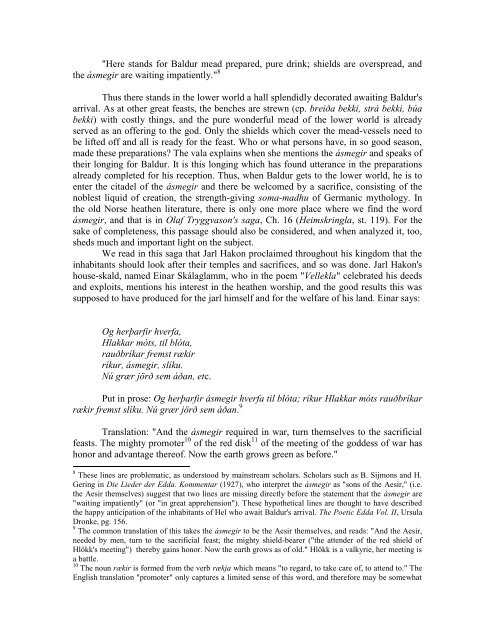Chapters 44-95 - Germanic Mythology
Chapters 44-95 - Germanic Mythology
Chapters 44-95 - Germanic Mythology
You also want an ePaper? Increase the reach of your titles
YUMPU automatically turns print PDFs into web optimized ePapers that Google loves.
"Here stands for Baldur mead prepared, pure drink; shields are overspread, and<br />
the ásmegir are waiting impatiently." 8<br />
Thus there stands in the lower world a hall splendidly decorated awaiting Baldur's<br />
arrival. As at other great feasts, the benches are strewn (cp. breiða bekki, strá bekki, búa<br />
bekki) with costly things, and the pure wonderful mead of the lower world is already<br />
served as an offering to the god. Only the shields which cover the mead-vessels need to<br />
be lifted off and all is ready for the feast. Who or what persons have, in so good season,<br />
made these preparations? The vala explains when she mentions the ásmegir and speaks of<br />
their longing for Baldur. It is this longing which has found utterance in the preparations<br />
already completed for his reception. Thus, when Baldur gets to the lower world, he is to<br />
enter the citadel of the ásmegir and there be welcomed by a sacrifice, consisting of the<br />
noblest liquid of creation, the strength-giving soma-madhu of <strong>Germanic</strong> mythology. In<br />
the old Norse heathen literature, there is only one more place where we find the word<br />
ásmegir, and that is in Olaf Tryggvason's saga, Ch. 16 (Heimskringla, st. 119). For the<br />
sake of completeness, this passage should also be considered, and when analyzed it, too,<br />
sheds much and important light on the subject.<br />
We read in this saga that Jarl Hakon proclaimed throughout his kingdom that the<br />
inhabitants should look after their temples and sacrifices, and so was done. Jarl Hakon's<br />
house-skald, named Einar Skálaglamm, who in the poem "Vellekla" celebrated his deeds<br />
and exploits, mentions his interest in the heathen worship, and the good results this was<br />
supposed to have produced for the jarl himself and for the welfare of his land. Einar says:<br />
Og herþarfir hverfa,<br />
Hlakkar móts, til blóta,<br />
rauðbríkar fremst rækir<br />
ríkur, ásmegir, slíku.<br />
Nú grær jörð sem áðan, etc.<br />
Put in prose: Og herþarfir ásmegir hverfa til blóta; ríkur Hlakkar móts rauðbríkar<br />
rækir fremst slíku. Nú grær jörð sem áðan. 9<br />
Translation: "And the ásmegir required in war, turn themselves to the sacrificial<br />
feasts. The mighty promoter 10 of the red disk 11 of the meeting of the goddess of war has<br />
honor and advantage thereof. Now the earth grows green as before."<br />
8 These lines are problematic, as understood by mainstream scholars. Scholars such as B. Sijmons and H.<br />
Gering in Die Lieder der Edda. Kommentar (1927), who interpret the ásmegir as "sons of the Aesir," (i.e.<br />
the Aesir themselves) suggest that two lines are missing directly before the statement that the ásmegir are<br />
"waiting impatiently" (or "in great apprehension"). These hypothetical lines are thought to have described<br />
the happy anticipation of the inhabitants of Hel who await Baldur's arrival. The Poetic Edda Vol. II, Ursula<br />
Dronke, pg. 156.<br />
9 The common translation of this takes the ásmegir to be the Aesir themselves, and reads: "And the Aesir,<br />
needed by men, turn to the sacrificial feast; the mighty shield-bearer ("the attender of the red shield of<br />
Hlökk's meeting") thereby gains honor. Now the earth grows as of old." Hlökk is a valkyrie, her meeting is<br />
a battle.<br />
10 The noun rækir is formed from the verb rækja which means "to regard, to take care of, to attend to." The<br />
English translation "promoter" only captures a limited sense of this word, and therefore may be somewhat
















